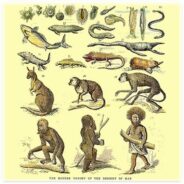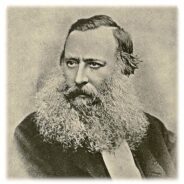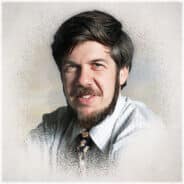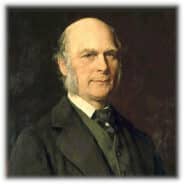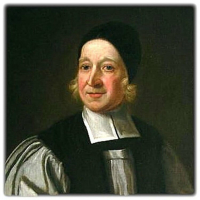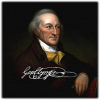Where Does Darwinism Work?

- 35
- 35shares
Other than being a successful instrument to force a secularist worldview upon the American classroom, the truly rational individual asks, "Where does Darwinism work?" On February 12, evolutionists around the world celebrate Darwin Day, the birthday of Charles Darwin (1809). In 1859, Charles Darwin published the book that gave him world recognition, On the Origin of Species by Means of Natural Selection, or the Preservation of Favored Races in the Struggle for Life—usually referred to simply as Origin of Species. Just as Darwinism was deeply admired by the intellectuals of Hitler's Germany, Darwin's philosophy continues as the only hope of intellectual respectability for the irreligious secularist worldview. However, reflection upon the global influence of Darwin must cause the most sincere among us to question, "Where does Darwinism work?"
Table of Contents
Darwinism Does Not Work as Science
Do true Darwinists exist? Because true science has shown the light of truth upon Darwin's errors, very few Darwinists exist—though evolutionists would never want this fact to be understood in the American classroom! Topics beyond the scope of the article such as Darwin's pangenes,[1] vestigial organs, and other subjects have proven embarrassing to the cause of Darwinists by the revelations of true science—the findings of which have substantiated the teachings of biblical creationism. Seeking to avoid the embarrassment of Darwin and previous generations of Darwinists, the contemporary evolutionist refers to himself as a neo-Darwinist or new type of Darwinist that continues to build upon the fallacy that one specie is capable of producing another.
The real heart of the matter is that there is no evidence to support Darwin's philosophy that lower forms of life can mutate into higher forms of life—none whatsoever! For generations, students in American schools and classrooms around the world have been taught that the human race evolved over millions of years to its present state of existence. Even the title of Darwin's book, The Origin of Species, deceives the reader into believing Darwin is going to unfold the facts that defend his philosophy, but he fails to do so: "In spite of the title of his book, Origin of Species, the one thing Darwin never really dealt with was the origin of species."[2] In other words, not even Darwin was able to demonstrate how one specie became another.
What is more, those who have believed and advocated Darwin's philosophy cannot turn to science for evidence to support their opinions, but only the manipulation of the truth that was first presented to the world by a biblical creationist by the name of Edward Blyth . The principle of natural selection, so touted by evolutionists, was first presented to the world by Blyth, in a series of articles in The Magazine of Natural History between 1835 and 1837.[3] Blyth discussed the effects of artificial selection (later called natural selection ) upon species in the wild and how they were restored to their original state (or archetype) without permanent mutations that would have been necessary to support Darwin's theory. Blyth's work proved that artificial or natural selection could not form new species of life, but against the facts, Darwin and his disciples have, since the publication of Origin of Species in 1859, unsuccessfully attempted to prove the opposite. Blyth demonstrated the principle that man could breed pigeons to produce many fanciful varieties, but when left to breed naturally, they returned to the characteristics of the common rock pigeon.[4] Pigeons never become dogs or horses, nor do they become turkeys, as evolutionists suggest by bending the facts of artificial or natural selection. One farmer accused of practicing evolution when observing the practice of selective breeding in his farm animals responded to the accusing evolutionist: "Mister, when I cross pigs, I get pigs. I don't get cats and horses."[5] For more than a century and a half, evolutionists have been trying to convince the world that pigs produce horses—all because of natural selection resulting from the principle "survival of the fittest " or "tooth and claw ". We will see below how the evolutionary mode of operation—"tooth and claw"—was applied to societies around the world.
If Darwinian evolution is correct, all around the world fossils would be capable of demonstrating the philosophy of evolutionists that less complex forms of life should consistently be buried below more complex or more highly developed forms of life. The fossils closest to the earth's surface should be the most recent and most complex.[6] Evolutionists have referred to this as the geologic column —the layering of more complex fossils upon less complex forms of life to demonstrate that evolution occurred. However, this exists no place in the world—"It exists only in the minds of evolutionary geologists."[7] In fact, the record of fossils bears witness to the fact that so-called simple forms of life exist along side the most complex forms of life—evidence of creation, not evolution. Though he remained an evolutionist until the end of his life, Harvard University professor, Stephen J. Gould, was at least honest enough to invite his fellow evolutionists to forsake the form of Darwinian evolution to his theory of enormous leaps in evolution. Strangely enough, Gould and Niles Eldredge were willing to say evolutionists have never had the evidence to support Darwinian evolution, but Gould was willing to invite his fellow evolutionary philosophers to embrace his punctuated equilibria theory of evolution which was even far less plausible than Darwin's.[8]
Despite the loud claims of evolutionists, Darwinism does not work as a legitimate science—it is a philosophy of the origin of human life and is even unwilling to make a claim for the existence of matter![9]
Darwinism Does Not Work in Politics
Throughout his Origin of Species, Charles Darwin frequently stressed the struggle between weaker and stronger forms of life, with the stronger forms dominating the weaker to ensure the "survival of the fittest." Darwin's tooth and claw scientific philosophy immediately found appreciation for social and political policies around the world, producing some of the darkest moments of the twentieth century in particular and world history in general.
Among the first to recognize the social and political implications of Darwinism was Francis Galton, cousin of Darwin. In 1865, Galton published a work Hereditary Genius that was typical of many social and political policies in the twentieth century. By 1885, Galton had succinctly summarized the intent of his effort in this work with one word—eugenics, which was Galton's sophisticated terminology for the elimination of "unfit" or inferior people from society. One means of accomplishing this was through his proposed national biographical index of "desirables" and "undesirables" from which eligibility to marry could be determined by the state. We should not be surprised that those who so quickly came to embrace Darwin's "survival of the fittest" were simply reflecting the views of their master:
There is nothing to suggest that Darwin was opposed to eugenics in either its positive or its negative practices.[10]
In his book, Darwin: Portrait of a Genius, distinguished author, Paul Johnson, is candid concerning the devastating impact of the application of Darwin's philosophy to social agendas around the world.[11] These social policies were the rational extension of Darwinism and used by numerous world regimes to suppress and control ethnic populations that were considered inferior. Adolph Hitler adopted the use of Darwin, using Darwin's dominant theme of struggle his own autobiography, Mein Kampf—My Struggle! Two of Hitler's right-hand men "were students of Darwin"—Joseph Goebbels and Heinrich Himmler.[12] The Fathers of Communism, Karl Marx and Friedrich Engels, "pounced upon the Origin the week of its appearance,"[13] and bequeathed to their disciples Vladimir Lenin, Leon Trotsky, Joseph Stalin, Mao Tse-tung (Mao Zedong), and Pol Pot Darwin's legacy of struggle and death.[14] These followers of Charles Darwin, and many others unmentioned, have wielded a staggering influence upon world history that is difficult to comprehend. As author, Paul Johnson, concluded his chapter on Darwin's global social and political impact, he offered this dismal summary:
In the twentieth century, it is likely that over 100 million people were killed or starved to death as a result of totalitarian regimes infected with varieties of social Darwinism. . . . At the time Origin was published, there were about 1,325 million human beings in the world. By the time Mao Tse-tung, last of the great "exterminators," died—having himself presided over the deaths of 70 million—the human total had risen to 3,900 million.[15]
The truth is, Origin is a book that . . . had a devastating intellectual and emotional impact upon world society.[16]
Darwinism provides no constructive forms for social policies. Darwinism does not work in politics!
See our article: Irreligion, Wrong Religion, and Politics Never Mix!.America deserves to know its true heritage.
Please contribute today!
Conclusion: Darwinism Does Not Work
Advocated in the American classroom, and following the disciples of Darwin in the twentieth century, politicians and jurists cannot blame those responsible for the Great Recession of 2008. It is hypocritical for judges to mandate the teaching Darwin's "tooth and claw" philosophy and not expect their citizens to live it out! America watches breathlessly as "tooth and claw" is applied to families throughout the nation—with similar devastating results as when Darwinism was foisted upon the world in the twentieth century.
"Tooth and claw," "struggle," "survival of the fittest," as defined by Charles Darwin and summarized in his book Origin of Species does not work positively in any sphere of the human experience. In America, secularists have denied Christians the right to teach the creationist worldview of America's Founding Fathers. If America and the world is to avoid the same atrocities inflicted upon the world by Darwin and his disciples in the twentieth century, Christian in particular and Americans in general must increasing insist that legal and academic impediments to the restoration of the Christian worldview of America's Founding Fathers be restored to the public classroom. Christians must resist the tyranny of secular Darwinian philosophy in every sphere of life, asking themselves and the world, "Where does Darwinism work?"
Darwinism does not work in science! Darwinism does not work in politics! Darwinism (as demonstrated by the economic collapse of 2008) does not work in economics! Darwinism does not work in commerce! Darwinism does not work in the family! Simply put—Darwinism does not work any place! But, Thomas Carlyle understood that Jesus Christ and true Christianity does work against the "tooth and claw" of Darwin:
If we do not respect the law of nature, imposing our will by the might of the stronger, a day will come when the wild animals will again devour us — when the insects will eat the wild animals, and finally nothing will exist except the microbes. By means of the struggle the elites are continually renewed. The law of selection justifies this incessant struggle by allowing the survival of the fittest. Christianity is a rebellion against [Darwin's] natural law, a protest against [fallen] nature.[17]
[1] Concerning Darwin's idea of "pangenes," Dr. Gary Parker writes: "Like others of his time, Darwin didn't know about the mechanism of heredity. He thought that at reproduction each organ produced 'pangenes' that would collect in the blood and flow to the reproductive organs. So, a bigger neck [particularly on a giraffe] made more neck pangenes….Darwin even used pangenes to 'explain' why (in his opinion) wives grew to resemble their husbands as both got older." Creation Facts of Life (Green Forest, AR: Master Books), 88.
[2] Parker, Creation Facts of Life, 83.
[3] Parker, Creation Facts of Life, 75; cf. "Edward Blyth," Wikipedia (http://en.wikipedia.org/wiki/Edward_Blyth, February 11, 2014).
[4] Parker, Creation Facts of Life, 71.
[5] Parker, Creation Facts of Life, 104.
[6] See Scott M. Huse, The Collapse of Evolution (Grand Rapids, MI: Baker Book House, 1989), chapter one.
[7] Huse, The Collapse of Evolution, 15.
[8] Niles Eldredge and Stephen J. Gould publish their thought on evolution, insisting that Darwin's gradual evolutionary theory never did have the evidence to support it claims. See "Punctuated equilibria: An Alternative to Phyletic Gradualism," in T.J.M. Schopf, ed., Models in Paleobiology (San Francisco: Freeman, Cooper and Company), 82-115. Strangely enough, Eldredge and Gould argued evolution had to come by huge leaps and bounds. As for evidence, never mind; evolutionists do not need any.
[9] Darwinists never wish to talk about cosmogony (the origin of the universe), but are quick to speak about cosmology (the study of the physical universe). Their discussion is limited to the physical, while Bible-believing Christians are willing to speak of the origin of the universe, the present world, and the world to come.
[10] Paul Johnson, Darwin, Portrait of a Genius (New York: Penguin Group, 2012), 130.
[11] See chapter seven, "Evils of Social Darwinism." Paul Johnson, Darwin, Portrait of a Genius, 123-136.
[12] Paul Johnson, Darwin, Portrait of a Genius, 135.
[13] Paul Johnson, Darwin, Portrait of a Genius, 135.
[14] Pol Pot received his Darwinism via professor Jean-Paul Sartre .
[15] Paul Johnson, Darwin, Portrait of a Genius, 136.
[16] Paul Johnson, Darwin, Portrait of a Genius, 130-31.
[17] Paul Johnson, Darwin, Portrait of a Genius, 134.
- 35
- 35shares

